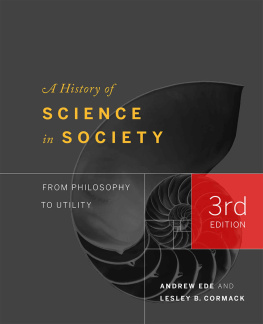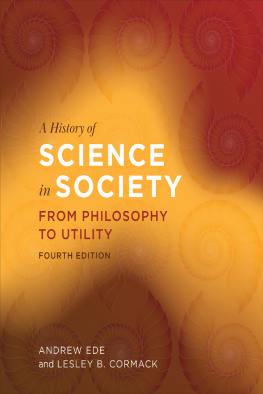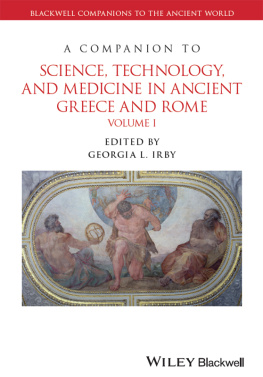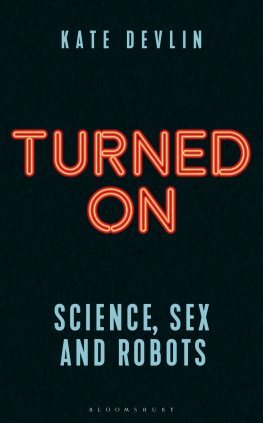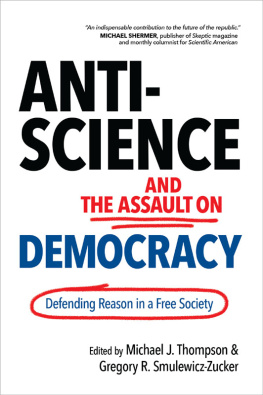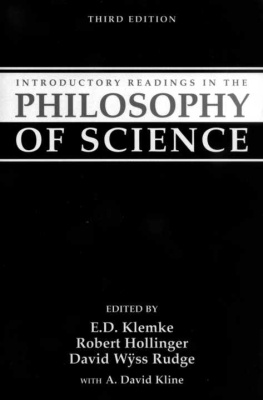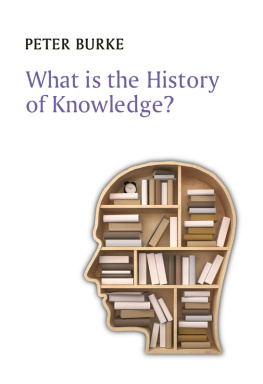A History of Science in Society
From Philosophy to Utility
Third Edition
Andrew Ede and Lesley B. Cormack

Copyright University of Toronto Press 2017
Higher Education Division
www.utppublishing.com
All rights reserved. The use of any part of this publication reproduced, transmitted in any form or by any means, electronic, mechanical, photocopying, recording, or otherwise, or stored in a retrieval system, without prior written consent of the publisheror in the case of photocopying, a licence from Access Copyright (Canadian Copyright Licensing Agency), 32056 Wellesley Street West, Toronto, Ontario, M5S 2S3is an infringement of the copyright law.
Library and Archives Canada Cataloguing in Publication
Ede, Andrew, author
A history of science in society : from philosophy to utility / by Andrew Ede and Lesley B. Cormack.Third edition.
Includes bibliographical references and index.
Issued in print and electronic formats.
ISBN 978-1-4426-3500-5 (hardcover).ISBN 978-1-4426-3499-2 (paperback).ISBN 978-1-4426-3501-2 (html).ISBN 978-1-4426-3502-9 (pdf) .
1. ScienceHistory. 2. ScienceSocial aspectsHistory. I. Cormack, Lesley B., 1957, author II. Title.
Q125.E33 2016 509 C2016-901619-6
C2016-901620-X
We welcome comments and suggestions regarding any aspect of our publicationsplease feel free to contact us at .
North America
5201 Dufferin Street
North York, Ontario, Canada, M3H 5T8
2250 Military Road
Tonawanda, New York, USA, 14150
ORDERS PHONE : 18005659523
ORDERS FAX : 18002219985
ORDERS E-MAIL :
UK, Ireland, and continental Europe
NBN International
Estover Road, Plymouth, PL6 7PY, UK
ORDERS FAX : 44 (0) 1752 202333
ORDERS PHONE : 44 (0) 1752 202301
ORDERS E-MAIL :
Every effort has been made to contact copyright holders; in the event of an error or omission, please notify the publisher.
The University of Toronto Press acknowledges the financial support for its publishing activities of the Government of Canada through the Canada Book Fund.
Printed in the United States of America.
Illustrations
Figures
Plates
Acknowledgments
To Graham and Quin, who have grown up with this bookand who put up with two authors working in the house at the same time. We would also like to thank those people who helped make this book possible: our editor and publisher; friends and colleagues who read early drafts and gave advice; reviewers and users who have offered helpful criticism and forced us to defend our position; and all the amazing historians of science on whose shoulders (or toes) we stand.
Introduction
Science has transformed human history. It has changed how we see the universe, how we interact with nature and each other, and how we live our lives. It may, in the future, even change what it means to be human. The history of such a powerful force deserves a full and multifaceted examination. Yet a history of science is unlike a history of monarchs, generals, steam engines, or wars because science isnt a person, an object, or an event. It is an idea, the idea that humans can understand the physical world.
This is a history of what happens when a legion of thinkers, at different times and from different backgrounds, turned their minds and hands to the investigation of nature. In the process, they transformed the world.
The history of science is such a vast subject that no single book about it can really be comprehensive, and so the story we tell examines science from a particular point of view. Some histories of science have focused on the intellectual development of ideas, while others have traced the course of particular subjects such as astronomy or physics. In this book, we have chosen to look at science from two related perspectives that we believe offer a window onto the historical processes that shaped the study of nature. First, we have examined the link between the philosophical pursuit of knowledge and the desire of both the researchers and their supporters to make that knowledge useful. There has always been a tension between the intellectual aspects of science and the application of scientific knowledge. The ancient Greek philosophers struggled with this problem, and it is still being debated today. The call in every age by philosophers and scientists for more support for research for its own sake is indicative of the tension between the search for knowledge and the pressure to apply that knowledge. What counts as useful knowledge differed from patron to patron and society to society, so that the Grand Duke Cosimo de Medici and the United States Department of Energy looked for quite different products to be created by their clients, but both traded support for the potential of utility.
The tension between intellectual pursuits and demands for some kind of product not only was felt by many natural philosophers and scientists but has also led to controversy among historians of science. Where does science end and technology begin? they have asked. Perhaps the most famous articulation of this is the scholar and craftsman debate. Historians of science have tried to understand the relationship between those people primarily interested in the utility of knowledge (the craftsmen) and those interested in the intellectual understanding of the world (the scholars). Some historians have denied the connection, but we feel it is integral to the pursuit of natural knowledge. The geographers of the early modern period provide a good example of the necessity of this interconnection. They brought the skills of the navigator together with the abstract knowledge of the mathematician. Translating the spherical Earth onto flat maps was an intellectual challenge, while tramping to the four corners of the globe to take measurements was an extreme physical challenge. Getting theory and practice right could mean the difference between profit or loss, or even life and death.
Our second aim has been to trace the history of science by its social place. Science does not exist in disembodied minds, but is part of living, breathing society. It is embedded in institutions such as schools, princely courts, government departments, and even in the training of soldiers. As such, we have tried to relate scientific work to the society in which it took place, tracing the interplay of social interest with personal interest. This has guided our areas of emphasis so that, for example, we give alchemy a greater allocation of space than some other histories of science because it was more socially significant than topics such as astronomy or physics in the same period. There were far more alchemists than astronomers, and they came from all ranks and classes of people, from peasants to popes. In the longer term, the transformation of alchemy into chemistry had a very great impact on the quality of everyday life. This is not to say that we neglect astronomy or physics, but rather that we have tried to focus on what was important to the people of the era and to avoid projecting the importance of later work on earlier ages.
In each chapter, we have highlighted one aspect of this interaction of science and society, from politics and religion to economics and warfare, under the heading Connections. While each of these vignettes is part of the larger narrative of the book, they can also be read as individual case studies.

